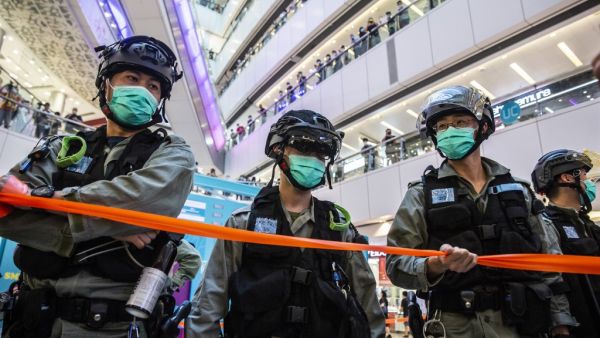Hong Kong police have been granted permission to carry out warrant-less home searches under China's new national security law after the city's government unveiled vastly expanded powers authorised by Beijing.
Officers now also have the right to ban suspects from leaving the city, confiscate their assets, conduct secret surveillance and intercept communications, according to a clause of the law that went into effect today.
Protesters who were arrested under the legislation last week for allegedly carrying pro-independence flags and banners had to have their DNA samples taken, in a move that sparked debate on the necessity of the police's practice.
The news comes as Hong Kong's Beijing-backed leader vowed to 'vigorously implement' the controversial legislation. The city's Chief Executive Carrie Lam on Tuesday defended China's new security law for the financial hub, saying it would restore stability and confidence.
It also comes as a report suggests that China could send hundreds of paramilitary police officers to the former British colony as 'observers'.
Lam's government last night issued the details of Article 43 in the law, which outlines the measures that the police force can take to implement the legislation in the city.
According to the rules, the police may be authorised to conduct searches for evidence without a warrant in 'exceptional circumstances'.
Police may also apply for an authorisation that requires a person suspected of violating the national security law to surrender their travel documents, thus restricting them from leaving Hong Kong.
Additionally, under the rules, written notices or restraining orders may be issued to freeze or confiscate property if there are 'reasonable grounds' to suspect that the property is related to an offence endangering national security.
Platforms and publishers, as well as internet service providers, may also be ordered to take down electronic messages published that are 'likely to constitute an offence endangering national security or is likely to cause the occurrence of an offence endangering national security'.
Service providers who do not comply with such requests could face fines of up to 100,000 Hong Kong dollars (£10,338, $12,903) and receive jail terms of six months.
Individuals who post such messages may also be asked to remove the message or face similar fines and a jail term of one year.
Hong Kong police have made at least 10 official arrests under the controversial new security law since it kicked in at 23:00 local time on 30 June.
Police collected DNA samples from them and searched their homes, according to Janet Pang, a lawyer for several of the protesters, who called officers' practice 'unnecessary, intrusive and disproportionate'.
Ms Pang told Bloomberg: 'I don't know why they had to take DNA samples. We don't know what kind of database they're trying to build which might be sent back to the central government in Beijing.'
Police confirmed that they had collected DNA samples from the 10 people arrested over the new national security law on July 1, reported South China Morning Post.
Speaking at a press conference a week after China imposed the law on the semi-autonomous city, Chief Executive Lam today combined warnings with assurances to Hong Kong's 7.5 million residents.
The Hong Kong government will vigorously implement this law,' she said. 'And I forewarn those radicals not to attempt to violate this law, or cross the red line, because the consequences of breaching this law are very serious.'
She denied allegations the law would stifle freedoms and hit out at what she said were 'fallacies' written about its impact.
'Surely this is not doom and gloom for Hong Kong,' Lam said.
'I'm sure with the passage of time... confidence will grow in "One Country, Two Systems" and in Hong Kong's future,' she added, naming the model that allows Hong Kong to keep certain liberties and autonomy from the mainland.
The national security law is the most radical shift in how Hong Kong is run since the city was handed back to China by Britain in 1997.
The content was kept secret from Hong Kongers until the moment it was imposed one week ago, bypassing the city's legislature.
It targets crimes under four categories: subversion, secession, terrorism and colluding with foreign forces and gives China jurisdiction in some especially serious cases.
Legal analysts, critics and many western nations warn the broadly-worded categories could criminalise many peaceful dissenting opinions.
Hong Kongers have scrubbed social media accounts, businesses have taken down protest displays while libraries and schools have removed certain books from their shelves.
Lam rejected suggestions the law had alarmed residents and said the legislation was designed to protect the freedoms of the majority.
'I have not seen widespread fears amongst Hong Kong people in the last week,' she said.
'This national security law is actually relatively mild.'
Her press conference came hours after the government unveiled vastly expanded powers to conduct warrantless raids and surveillance -- as well as issue internet takedown notices -- under the law.
These rules were announced in a document released after the inaugural meeting on Monday of a new national security commission, which is headed by Beijing's top envoy to the city.
On Tuesday Lam said all future workings of the committee would be kept secret.
This article has been adapted from its original source.









